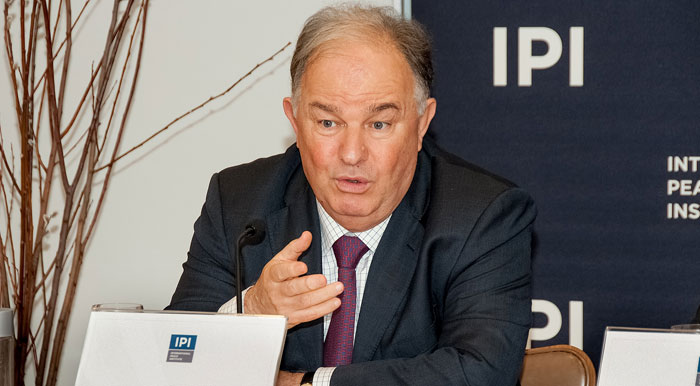
“Renowned 21st century poet Muhammad Iqbal of Lahore used the term ‘heart of Asia’ to denote the strategic location of Afghanistan at the center of the Asian continent. This term has been the inspiration behind the Istanbul Process,” said Ambassador Ertuğrul Apakan, the Permanent Representative of Turkey to the United Nations.
“Afghanistan, with its natural resources and human potential, is indeed a country of the future, and regional dimensions have a significant role to play in this promising future that awaits Afghanistan.”
Ambassador Apakan spoke at an IPI event on September 14, 2012 entitled “The Istanbul Process on Regional Security and Cooperation for a Secure and Stable Afghanistan.” He was joined by Ambassador Zahir Tanin, the Permanent Representative of Afghanistan to the United Nations, and Dr. Keith Stanski, the Senior Program Officer of the Afghanistan Regional Project at NYU’s Center on International Cooperation.
The Istanbul Process was declared on November 2, 2011 and was agreed to by 13 Asian countries. “Regional cooperation, as envisaged by the Istanbul Process, aims to collectively enhance political dialogue among all ‘heart of Asia’ countries in a result-oriented and practical framework,” said Ambassador Apakan.
Ambassador Tanin added, “Through time and experience, we all came to realize an obvious reality: that challenges of terrorism, extremism, and narcotics threaten the safety and well-being of all our peoples, and that increase in trade and transit and investment in human and natural resources will help to improve the lives of all our citizens and help to guarantee a more prosperous life and future for generations to come.”
“In the 1990s, the attitude of the macro-region toward Afghanistan was how to save themselves from the flames of the Afghan war. In 2000s, this attitude changed to how to work in Afghanistan together for stability and peace.”
Ambassador Tanin and Ambassador Apakan spoke about the historical relationship between Turkey and Afghanistan, a relationship that both permanent representatives referred to as brotherly. “Afghanistan and Turkey have been allies since 1920–a year after Afghanistan’s independence–while Turkey was reestablishing after the fall of its empire. Turkey played a vital role nonetheless in building the Afghan state,” said Ambassador Tanin. “The first Afghan girls who pursued education abroad went to Turkey.”
On the term “Heart of Asia,” Ambassador Tanin said that the term was not only a poetic fact, but a geographical fact, one that revolved around geopolitical and economical interests.
Dr. Stanski explained that the Istanbul Process was developing at a volatile time in Afghanistan–during the nation’s security transition–and that the process needed regional support. “The success of the Istanbul Process I think will be measured by its ability to broaden and really involve larger sectors,” he said. “The vision is not to supercede existing structures, but rather create bridges across them.”
Ambassador Tanin said, “We underscore the need for international support of our efforts on the way forward. We stand ready to work with all our friends and partners in the region and beyond for stability and prosperity.”
“We started with a conference. Now, we are in the middle of a process, and that’s a big achievement.”
The event was moderated by Ambassador Maureen Quinn, IPI Senior Adviser.
Watch event:







